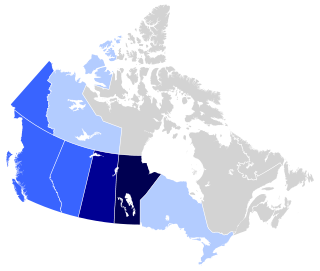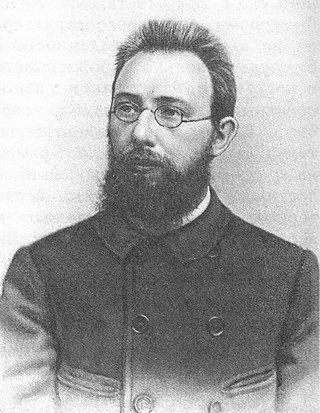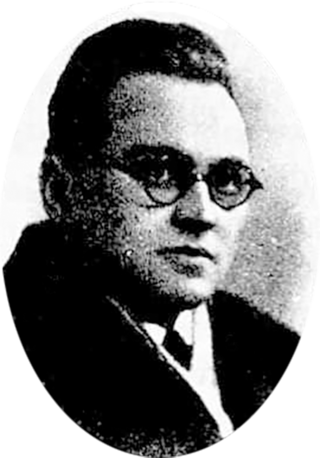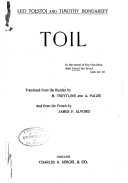Related Research Articles

The Doukhobors or Dukhobors are a Spiritual Christian ethnoreligious group of Russian origin. They are known for their pacifism and tradition of oral history, hymn-singing, and verse. They reject the Russian Orthodox priesthood and associated rituals, believing that personal revelation is more important than the Bible. Facing persecution by the Russian government for their nonorthodox beliefs, many migrated to Canada between 1899 and 1938, where most currently reside.

Juri Lotman was a prominent Russian-Estonian literary scholar, semiotician, and historian of Russian culture, who worked at the University of Tartu. He was elected a member of the British Academy (1977), Norwegian Academy of Science and Letters (1987), Royal Swedish Academy of Sciences (1989) and Estonian Academy of Sciences (1990). He was a founder of the Tartu–Moscow Semiotic School. The number of his printed works exceeds 800 titles. His archive which includes his correspondence with a number of Russian and Western intellectuals, is immense.

Ukrainian literature is literature written in the Ukrainian language.

Russian Canadians comprise Canadian citizens of Russian heritage or Russians who immigrated to and reside in Canada. According to the 2021 Census, there were 548,140 Canadians who claimed full or partial Russian ancestry. The areas of Canada with the highest percentage population of Russian Canadians are the Prairie Provinces.

Vyacheslav Vsevolodovich Ivanov was a prominent Soviet/Russian philologist, semiotician and Indo-Europeanist probably best known for his glottalic theory of Indo-European consonantism and for placing the Indo-European urheimat in the area of the Armenian Highlands and Lake Urmia.

Vladimir Dmitriyevich Bonch-Bruyevich was a Soviet politician, revolutionary, historian, writer and Old Bolshevik. He was Vladimir Lenin's personal secretary.

Aylmer Maude and Louise Maude (1855–1939) were English translators of Leo Tolstoy's works, and Aylmer Maude also wrote his friend Tolstoy's biography, The Life of Tolstoy. After living many years in Russia the Maudes spent the rest of their lives in England translating Tolstoy's writing and promoting public interest in his work. Aylmer Maude was also involved in a number of early 20th century progressive and idealistic causes.
Doukhobor Russian, also called Doukhobor dialect and Doukhoborese is a dialect of the Russian language spoken by Doukhobors, spiritual Christians from Russia who in 1899 established a number of commune-style settlements in Western Canada. They have brought with them a Southern Russian dialect of their communities of origin, which over the following decades underwent some changes under the influence of the Canadian English environment and the speech of the Ukrainian settlers in Saskatchewan.
Boris Mikhailovich Eikhenbaum was a Russian Empire and Soviet literary scholar and historian of Russian literature. He is a representative of Russian formalism.

Peter Vasilevich Verigin often known as Peter "the Lordly" Verigin was a Russian philosopher, activist, and leader of the Community Doukhobors in Canada. The prepetrators of his assassination in 1924 have never been identified.
Vasily Nikolaevich Pozdnyakov (1869–1921) was one of the members of the Russian Doukhobor community who in 1895 declared themselves conscientious objectors. Severely punished and exiled to Yakutia, he escaped and wrote an important account of his and his comrades' story, published internationally. He also authored a number of articles about the Doukhobor life in Russian Empire and Canada.

Leo Wiener (1862–1939) was an American historian, linguist, author and translator.

James Mavor was a Scottish-Canadian economist. He served as a Professor of Political Economy of the University of Toronto from 1892 to 1923. His influence upon Canadian economic thought is traced to as late as the 1970s. He played a key role in resettling Doukhobor religious dissidents from the Russian Empire to Canada. He was also a noted arts promoter.

Count Lev Nikolayevich Tolstoy, usually referred to in English as Leo Tolstoy, was a Russian writer regarded as one of the greatest authors of all time. He received nominations for the Nobel Prize in Literature every year from 1902 to 1906 and for the Nobel Peace Prize in 1901, 1902, and 1909.
Victor A. Friedman is an American linguist, Slavist. He is the Andrew W. Mellon Distinguished Service Professor in Humanities at the University of Chicago. He holds an appointment in the Department of Linguistics and an associate appointment in the Department of Anthropology. He has published numerous articles in English, Macedonian, and Albanian.

The Triumph of the Farmer or Industry and Parasitism is a treatise by Russian peasant philosopher Timofei Bondarev. The work details Bondarev's labor philosophy, in particular his idea of "bread-labor", by which every man is responsible for the physical labor required to sustain himself. The treatise captivated writer Leo Tolstoy, who began a long correspondence with Bondarev and endeavored for years to see the work published. An abbreviated version was published in 1888, and the full work was published in 1906.

Count Sergei Lvovich Tolstoy was a composer and ethnomusicologist who was among the first Europeans to make an in-depth study of the music of India. He was also an associate of the Sufi mystic, Inayat Khan, and participated in helping the Doukhobors move to Canada.
Harlow Loomis Robinson is a Matthews Distinguished University Professor of History at Northeastern University who specializes in Soviet and Russian cultural history, with writings on Soviet film and performing arts.
The First Distiller, subtitled How the Imp Earned a Crust, is a play by Leo Tolstoy published in 1886, and translated into English by Aylmer and Louise Maude.
Ivan Avakumović was a Serbian-Canadian historian who was Professor Emeritus of History at the University of British Columbia.
References
- 1 2 3 "DONSKOV, Andrew". Department of Modern Languages and Literatures. Archived from the original on 2021-07-25.
- 1 2 "Andrew Donskov". EN.